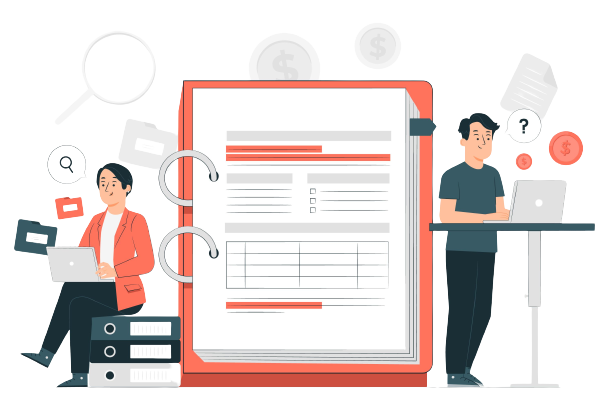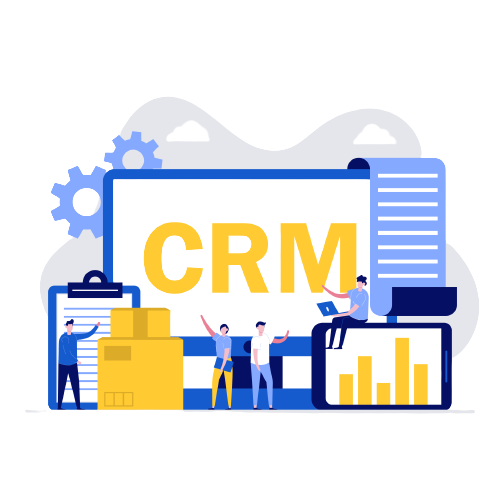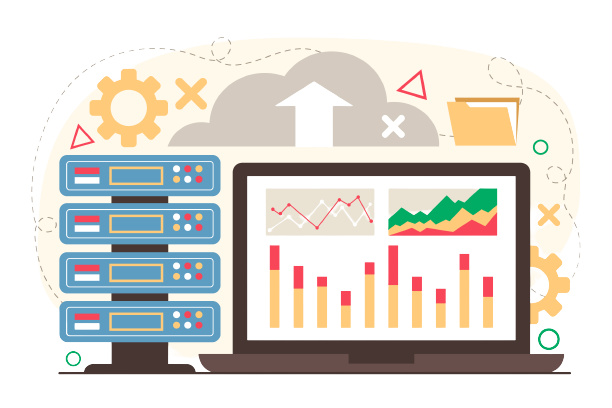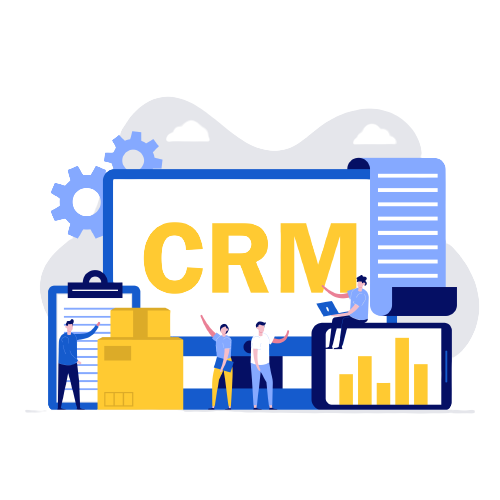
In this blog, we’re going to explore how CRM software can be like a guardian angel for your business, protecting you from billing mistakes and conflicts with customers. We’ll show you how CRM software can make your business run smoothly, keep your customers happy, and give you more peace of mind.
In the business world, making sure you get paid correctly and keeping customers happy is super important. But sometimes, mistakes happen in billing, and disagreements with customers can pop up, causing headaches.
If you’ve ever had to deal with billing mix-ups or arguments with customers about payments, don’t worry—it’s a common issue. The good news is that there’s a helpful tool called CRM and invoicing software that can come to your rescue.
Whether you’re a seasoned business pro or just starting out, we’ll explain how the right CRM software can change the way you handle billing and make your customers even happier. So, let’s get started and find out how CRM software can make billing a breeze!
Understanding Billing Challenges
Billing is a critical aspect of any business operation, and understanding the common challenges that organizations face in this area is essential. In this section, we’ll delve into two key aspects of billing challenges: identifying common billing errors and the impact of billing disputes on businesses.
Identifying Common Billing Errors

Billing errors can happen for various reasons, from human errors to technical glitches. Identifying these errors is the first step in addressing them effectively. Here are some of the most common billing errors businesses encounter:
- Data Entry Mistakes: Data entry errors are among the most prevalent billing issues. These errors occur when information is incorrectly inputted into billing systems or invoices. Common mistakes include typos in customer names, incorrect product or service descriptions, and inaccurate pricing.
- Duplicate Billing: Sending duplicate invoices can lead to confusion and frustration for customers. It often happens due to system errors or manual oversight, where invoices are generated and sent multiple times for the same transaction.
- Incorrect Billing Amounts: Billing for the wrong amounts is a serious issue that can erode customer trust. This can result from miscalculations, pricing discrepancies, or failure to apply discounts or promotions accurately.
- Late or Missed Invoices: Late or missed invoices can disrupt cash flow and create financial difficulties for both the business and its customers. These issues can occur due to manual invoicing processes or inadequate billing reminders.
- Non-Compliance with Contractual Agreements: Failure to adhere to contractual agreements with customers can lead to billing disputes. This may involve not providing services as agreed upon, overcharging, or underdelivering on contracted services.
The Impact of Billing Disputes on Businesses

Billing disputes can have far-reaching consequences for businesses, affecting their financial stability, reputation, and customer relationships. Here’s a closer look at the impact of billing disputes:
- Financial Strain: Billing disputes often lead to delayed or withheld payments. This can disrupt a company’s cash flow, making it challenging to cover operational expenses, pay employees, or invest in growth initiatives.
- Damage to Reputation: Frequent billing disputes can tarnish a company’s reputation. Customers who experience billing issues may become frustrated and share their negative experiences with others, potentially deterring new customers and eroding trust among existing ones.
- Administrative Burden: Handling billing disputes can be time-consuming and resource-intensive. Businesses must allocate staff and resources to investigate, resolve, and document these disputes, diverting valuable resources from core operations.
- Legal Consequences: In some cases, unresolved billing disputes can escalate into legal matters, leading to costly litigation. This not only consumes time and money but also creates additional stress and reputational damage.
- Customer Churn: Customers dissatisfied with billing disputes may choose to take their business elsewhere. High customer churn rates can be detrimental to a company’s long-term sustainability and growth.
- Regulatory Compliance Issues: Failing to address billing disputes adequately can result in compliance issues with industry regulations or consumer protection laws. This may lead to fines, penalties, or legal actions against the business.
By identifying common billing errors and recognizing the significant impact of billing disputes, organizations can implement effective strategies and systems to minimize errors, resolve disputes promptly, and maintain positive customer relationships.
The Role of CRM Software in Billing

Effective billing processes are essential for the financial health and success of any business. In today’s fast-paced and data-driven world, relying solely on manual billing methods is not only time-consuming but also prone to errors. This is where CRM software plays a crucial role. Let’s explore how CRM software contributes to billing by streamlining processes and providing automation for accuracy.
(I) Streamlining Billing Processes
- Centralized Customer Data: CRM software acts as a centralized repository for all customer information. It gathers data from various touchpoints and departments, including sales, marketing, and customer service. When it comes to billing, having a comprehensive view of customer data ensures that billing information is accurate and up-to-date.
- Efficient Information Retrieval: With CRM, accessing customer details, transaction history, and billing records becomes a breeze. This quick and easy access to information minimizes the time spent on searching for relevant data when preparing invoices or resolving billing inquiries.
- Personalized Billing: CRM allows businesses to segment their customer base and tailor billing processes accordingly. This personalization ensures that invoices are sent to the right individuals or departments, with customized details that reflect the unique agreements or pricing structures in place.
- Seamless Communication: Effective billing often involves collaboration among different teams, including sales, finance, and customer support. CRM systems facilitate seamless communication by enabling team members to access shared customer data and notes, reducing the risk of misunderstandings or discrepancies.
Automation for Accuracy
- Automated Billing Cycles: CRM software can automate billing cycles, ensuring that invoices are generated and sent at the right intervals. Whether it’s monthly, quarterly, or annually, automation reduces the risk of missing billing deadlines and improves cash flow predictability.
- Error Reduction: Manual data entry is prone to errors, which can lead to billing inaccuracies and disputes. CRM systems minimize the need for manual input by populating billing details from existing customer records. This not only reduces errors but also enhances billing consistency.
- Invoice Customization: CRM software enables businesses to create templates for invoices, making it easy to generate professional-looking documents. These templates can include company branding, payment terms, and itemized charges, ensuring that every invoice adheres to your business’s standards.
- Automatic Payment Reminders: Late payments are a common issue in billing. CRM systems can automate payment reminders, sending notifications to customers before or on the due date. This feature not only helps improve cash flow but also fosters better customer relationships by reducing the need for uncomfortable collection calls.
- Billing Analytics: CRM software provides insights into billing trends and customer payment behaviors. By analyzing this data, businesses can make informed decisions about pricing strategies, credit terms, and collections, ultimately improving revenue management.
Thus, it can be said that CRM software plays a pivotal role in billing processes by streamlining operations and automating critical tasks. This not only enhances efficiency and accuracy but also contributes to better customer relationships.
(II) Data Integration for Error Reduction
Effective data management is crucial for any business, especially when it comes to billing processes. Manual data entry and fragmented data systems can lead to errors, which, in turn, can result in billing disputes and customer dissatisfaction. To mitigate these challenges and reduce billing errors, businesses turn to service management software with data integration capabilities.
(III) Centralized Customer Data
Centralizing customer data is a fundamental step in reducing billing errors. Many businesses have customer information spread across various departments and systems, making it easy for discrepancies to occur. Here’s how CRM software helps in centralizing customer data:
- Single Source of Truth: CRM systems serve as a centralized repository for all customer-related information. This includes contact details, purchase history, communication logs, and billing preferences. Having a single source of truth ensures that everyone in the organization accesses consistent and up-to-date data.
- Streamlined Access: With CRM software, authorized team members can access relevant customer data quickly and easily. This accessibility facilitates accurate billing processes, as all the necessary information is readily available.
- Data Consistency: CRM systems enforce data consistency by standardizing formats and entry rules. This reduces the likelihood of errors caused by inconsistent data formatting or naming conventions.
(IV) Eliminating Manual Data Entry Errors
Manual data entry is a notorious source of billing errors. Even the most diligent employees can make mistakes when manually inputting data. CRM software offers solutions to eliminate or significantly reduce these errors:
- Automated Data Capture: CRM systems can integrate with various data sources, including emails, web forms, and other software applications. This integration allows for automated data capture, reducing the need for manual data entry. For example, when a customer submits an order online, CRM software can automatically populate the relevant billing details.
- Data Validation: CRM systems can be configured to validate data entries in real time. If an entry does not meet predefined criteria (e.g., correct format for phone numbers or email addresses), the system can flag it as an error, preventing inaccurate data from entering the system.
- Data Import/Export: CRM software facilitates bulk data import and export, minimizing the need for manual entry when transferring data between systems or during data migration. This not only reduces errors but also saves valuable time.
- Workflow Automation: By automating billing workflows within CRM, you can ensure that the right data is captured at the right time. For instance, when a customer places an order, CRM software can trigger automated processes that gather and verify all the necessary billing information.
The Benefits of Data Integration for Error Reduction

Implementing data integration within CRM systems offers numerous benefits beyond error reduction:
- Improved Efficiency: Automated data integration and centralized data storage streamline billing processes, reducing the time and effort required to manage customer information.
- Enhanced Customer Experience: Accurate billing and timely invoicing contribute to a positive customer experience. Customers appreciate error-free transactions and billing that aligns with their expectations.
- Better Decision-Making: Access to centralized and accurate customer data empowers your team to make informed decisions related to billing, pricing, and customer engagement.
- Compliance and Security: Centralized data management allows for better control over data access and security, ensuring compliance with data protection regulations.
By centralizing customer data and automating data capture and validation, businesses can minimize manual data entry errors, enhance the customer experience, and make more informed decisions related to billing and customer management.
Enhanced Communication and Collaboration
Effective communication and collaboration are essential components of any successful business operation. When it comes to reducing billing errors and disputes with CRM software, enhancing communication and collaboration plays a crucial role. In this section, we’ll delve into how CRM software facilitates better communication within your teams and promotes transparency through customer notifications.
Keeping Teams Informed
One of the key advantages of using CRM software in billing processes is its ability to keep your internal teams informed and aligned. Here’s how it works:
- Centralized Data Repository: CRM systems serve as centralized data repositories where all billing information is stored. This means that your sales, finance, and customer service teams can access the same, up-to-date billing data from a single source. No more sifting through spreadsheets or emails to find the latest information.
- Real-Time Updates: With CRM software, data is updated in real-time. When a billing update is made, it’s immediately reflected across the system. This ensures that all team members are working with the most current information, reducing the likelihood of errors that result from outdated data.
- Customized Access Permissions: CRM systems allow you to set access permissions for different team members based on their roles and responsibilities. This ensures that sensitive billing data is only accessible to those who need it, enhancing security and compliance.
- Collaboration Tools: Many CRM systems come with built-in collaboration tools like chat, task management, and document sharing. This enables team members to communicate and collaborate on billing-related tasks directly within the CRM platform, reducing the need for external communication channels.
By keeping your teams informed and ensuring they have easy access to accurate billing data, CRM software helps prevent miscommunication and errors that can lead to billing disputes.
Customer Notifications and Transparency

Transparency is crucial when it comes to billing. Customers appreciate being kept in the loop regarding their financial transactions, and CRM software can assist in achieving this transparency:
- Automated Notifications: CRM systems allow you to set up automated notifications for customers regarding their billing statements, payment due dates, and any changes in their accounts. These notifications can be sent via email, SMS, or even through customer portals.
- Billing History Access: CRM software provides customers with access to their billing history and account statements. This self-service feature allows customers to review past transactions, invoices, and payments at their convenience, reducing the likelihood of disputes due to billing confusion.
- Payment Options: Through CRM systems, you can offer customers various payment options, including online payment gateways and automatic recurring payments. Clear and convenient payment methods can reduce billing disputes caused by payment delays or errors.
- Communication Logs: CRM systems maintain a record of all customer interactions and communications, including emails, calls, and messages. This log serves as a valuable resource in case of disputes, providing a clear history of all communication related to billing.
- Dispute Resolution Channels: CRM software often includes built-in dispute resolution channels where customers can easily raise questions or concerns about their bills. This direct line of communication can prevent disputes from escalating and allow for quicker resolutions.
By providing customers with clear notifications and access to their billing information, CRM software fosters transparency and trust. Customers feel more in control of their finances, leading to fewer billing disputes and improved customer satisfaction.
Billing Dispute Resolution: Tracking Disputes Within CRM

Billing disputes are an inevitable part of business operations, and how efficiently you handle them can significantly impact customer satisfaction and your bottom line. Customer Relationship Management (CRM) software plays a vital role in simplifying the process of tracking and resolving billing disputes. In this section, we’ll delve into how CRM software can help you effectively manage and track billing disputes.
Centralized Dispute Tracking
One of the primary advantages of using CRM software for billing dispute resolution is the ability to centralize all dispute-related information. With a well-implemented CRM system, you can create dedicated records or cases for each billing dispute. These records capture essential details, including the customer’s information, the disputed invoice or transaction, and the nature of the dispute.
By centralizing this information within your CRM, you create a comprehensive and easily accessible repository. This enables your team to quickly reference the details of a dispute, track its progress, and maintain a complete history of interactions related to the dispute.
Streamlined Communication with Customers
CRM software facilitates efficient communication with customers during the dispute resolution process. Here’s how it helps:
- Automated Notifications: CRM systems can automate the process of notifying customers about the status of their disputes. Automated email notifications can keep customers informed at various stages of the resolution process, reducing the need for manual follow-ups.
- Timely Responses: With CRM, your team can set up reminders and escalation processes to ensure timely responses to customer inquiries and disputes. This helps in preventing disputes from lingering and potentially escalating.
- Document Sharing: CRM platforms often include document management capabilities. This allows you to securely share relevant documents, such as invoices, contracts, or correspondence, directly with the customer through the CRM interface. It ensures that both parties have access to the necessary documentation to resolve the dispute.
- Consistent Messaging: CRM systems also support the standardization of communication templates and responses. This ensures that your team delivers consistent and accurate messages to customers throughout the resolution process.
Enhanced Customer Insights
Beyond dispute resolution, CRM software provides valuable insights into customer behavior and preferences. Leveraging this data can help you proactively address potential disputes and improve overall customer satisfaction:
- Identifying Trends: By analyzing dispute data within your CRM, you can identify recurring issues or patterns. This insight enables you to take proactive steps to address underlying problems, such as billing system errors or unclear invoicing practices.
- Personalization: CRM systems allow you to tailor your communication with customers based on their history and preferences. This personalization can go a long way in diffusing tensions during dispute resolution by showing customers that you understand their unique needs.
- Customer Feedback: CRM software often includes tools for collecting and analyzing customer feedback. This feedback can be invaluable for identifying areas of improvement in your billing processes and preventing future disputes.
- Collaboration and Accountability: Effective dispute resolution often involves multiple team members working together. CRM software enhances collaboration by providing a centralized platform where team members can collaborate on resolving disputes. It also enables clear assignment of responsibilities, ensuring that each team member knows their role in the resolution process.
Incorporating CRM software into your billing dispute resolution process can lead to more efficient, organized, and customer-centric practices. Ultimately, this contributes to improved customer relationships and a healthier bottom line for your business.
Scalability and CRM
As your company expands, so do your billing needs and challenges. This is where CRM billing software becomes indispensable, especially when it comes to handling billing and invoicing operations. Let’s explore how CRM software can aid in scalability, enabling you to adapt to growing billing needs and tackle complex billing scenarios.
Adapting to Growing Billing Needs
As your customer base expands and your business diversifies its products or services, your billing requirements naturally become more complex. Traditional manual billing processes can quickly become overwhelmed, leading to errors, inefficiencies, and customer dissatisfaction.
CRM software offers a scalable solution by automating billing processes. Whether you’re handling hundreds or thousands of transactions, CRM systems can efficiently generate invoices, track payments, and manage customer data. The ability to scale up without a proportional increase in administrative overhead is a significant advantage.
Moreover, CRM systems provide the flexibility to adapt to new billing models, pricing structures, and customer segmentation as your business evolves. This adaptability ensures that your billing processes remain agile and responsive to changing market demands.
Handling Complex Billing Scenarios
Complex billing scenarios often arise in businesses with various product/service offerings, subscription models, or multi-tiered pricing structures. These scenarios can lead to confusion among customers and billing errors that impact your revenue and reputation.
CRM software simplifies complex billing by allowing you to set up rules and automate calculations. For instance, you can configure the CRM system to apply discounts, calculate taxes, and prorate charges accurately. This ensures that every invoice reflects the unique terms and conditions of each customer’s agreement.
Additionally, CRM systems are equipped to handle recurring billing effortlessly. Whether you offer monthly subscriptions, annual contracts, or usage-based pricing, CRM software automates the generation of invoices at the appropriate intervals. It also keeps track of payment schedules and alerts you to any missed payments, reducing the risk of revenue leakage.
Thus, scalability and CRM go hand in hand when it comes to adapting to growing billing needs and managing complex scenarios. By implementing CRM software, businesses can efficiently scale their billing operations while maintaining accuracy and agility, ultimately supporting their growth and success.